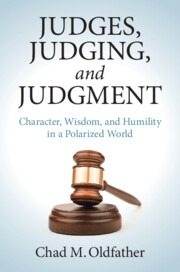Book contents
- Judges, Judging, and Judgment
- Judges, Judging, and Judgment
- Copyright page
- Dedication
- Contents
- Acknowledgments
- Introduction
- 1 The Standard Model of Judging
- 2 Indeterminacy and Ideology
- 3 The Psychology of Judging
- 4 Internal Constraints on Judicial Behavior
- 5 External Constraints on Judicial Behavior
- 6 The Importance (and Erosion) of Norms
- 7 Specialization and Methodology as Partial Solutions
- 8 Character, Wisdom, and Humility
- Conclusion
- Index
2 - Indeterminacy and Ideology
Published online by Cambridge University Press: 03 January 2025
- Judges, Judging, and Judgment
- Judges, Judging, and Judgment
- Copyright page
- Dedication
- Contents
- Acknowledgments
- Introduction
- 1 The Standard Model of Judging
- 2 Indeterminacy and Ideology
- 3 The Psychology of Judging
- 4 Internal Constraints on Judicial Behavior
- 5 External Constraints on Judicial Behavior
- 6 The Importance (and Erosion) of Norms
- 7 Specialization and Methodology as Partial Solutions
- 8 Character, Wisdom, and Humility
- Conclusion
- Index
Summary
This chapter focuses on work exploring the influence of ideology on judicial decision-making. It explores the nature of indeterminacy as developed by the Legal Realists and the Critical Legal Studies movement, the latter of whom regarded judicial decision-making as thoroughly political. It then takes up work, conducted largely by political scientists, that imagines judges as political actors in the same way that legislators are, and surveys both refinements to and critiques of that work.
Keywords
- Type
- Chapter
- Information
- Judges, Judging, and JudgmentCharacter, Wisdom, and Humility in a Polarized World, pp. 31 - 40Publisher: Cambridge University PressPrint publication year: 2025

